- Home
- Brian Falkner
The Project Page 3
The Project Read online
Page 3
“You’d forget your head if it wasn’t screwed on,” his mother said.
“I’ll run upstairs and shower,” Luke said.
“Just before you do that …,” his father said.
“Yeah?”
“Your school rang this afternoon. The vice principal.”
“Mr. Kerr. Oh …” Luke looked at his socks.
“Yes, ‘oh,’ ” his father said.
“Sorry about that,” Luke muttered.
“It’s like your last school all over again,” his father said.
“Sorry, Dad.”
“Luke, you can’t afford to get expelled. The university pays your fees at this school, and we can’t afford to pay your fees elsewhere.”
Luke’s mother’s eyes switched from Luke to his father when the conversation turned to money.
“It really wasn’t that big a—”
His father cut him off. “And what if they involve the police? If you get arrested, you could get deported to New Zealand, and that would mean we’d all have to go.”
Luke shut his mouth abruptly. It had never occurred to him that a stupid joke could result in their getting booted out of the country. That would be disastrous.
His family had been flat broke for a couple of years, since they were forced to sell the farm back in New Zealand. Even here in Iowa they were living in a dingy, creepy old house while his father tried to pay off his debts. They couldn’t even afford a TV.
“Sorry,” he said.
“Why do you do these things?” his mother asked.
“I just don’t think, I guess,” Luke said. “I always feel bad about it later.”
“You were born with a perfectly good brain. Why don’t you use it?” his father asked.
Luke shrugged.
“I sometimes think you were born with two brains,” his mother said. “Like the rabbit and the tortoise.”
“The hare,” Luke said.
“Whatever it is. You have a hare brain that makes you jump into anything without thinking, and a tortoise brain that allows you to slowly catch up, but always much too late.”
“That’s not quite the point of the hare and tortoise story, Mum.”
“Next time try to engage your other brain. The one that thinks about things before rushing into them,” his mother said.
“I’ll try.”
There was a pause and Luke waited. His father’s usual way was to hit him with the bad news, then try to end with something softer. To finish on a positive note.
“It was good work down by the river today, Luke,” his father said. “I heard about it through Philipp Khodier over in Physics. He said you were working really hard.”
Luke wondered if Philipp was the old rapper with the backward baseball cap.
“Easy as,” he said. “Just like digging ditches back on the farm.”
“Well, good on you anyway. If it wasn’t for that, we’d be grounding you for the other thing. So count your blessings.”
“And run upstairs for your shower,” his mother reminded him.
“Thanks, Dad. Thanks, Mum,” Luke said, and turned to go upstairs.
It was almost an hour later before he got to borrow his dad’s computer for his homework.
Kerr’s ultimatum had gone from his mind while they had worked at the river. But at home, reality struck, and he knew that he was in deep trouble if he couldn’t come up with something.
The most boring book in the world. He typed it into Google and hit ENTER.
There were a bunch of entries, from websites to blogs, all just individuals expressing their opinions on some book or other that they had read and did or didn’t like.
He flicked through the first few pages of results, looking for a complete list, the way some movie sites had lists of the best and worst movies of all time. But page after page, nothing looked like it would be useful.
The entry that finally caught his attention took him to an online encyclopedia article, and intrigued despite himself, he began to read.
The Most Boring Book in the World
Leonardo’s River, a novel by nineteenth-century New England inventor Darcy Benfer, is considered by many historians to be the most boring book ever printed. Its claim to this status is unproven, however, and disputed by other scholars.
Publication
Leonardo’s River was written and published by Darcy Benfer in the town of Longmeadow, Massachusetts, in 1853. Only one copy of the book was ever printed, due to a fire at the printer that destroyed the original manuscript and all of the printed pages of the book except for the copy that had been sent to the author for checking.
Accounts suggest that the printing press operator began to read the book while printing it and fell asleep, leading to the fire that destroyed the printery.[citation needed]
Cover
The cover of Leonardo’s River contains just the title of the book above a reproduction of Leonardo da Vinci’s drawing Vitruvian Man.
Reception
Few, if any, people are recorded as having read the book, partly due to the fact that there was only one copy available, and partly due to the difficulty of reading it.
Luke skipped over the rest of the article, as it didn’t really help his case. He was about to close the page when a final note caught his eye.
The only printed copy of the book was donated by Mr. Benfer to the Franklin Public Library in Franklin, Massachusetts, in 1857. Thirty years later, a search of the library storage areas failed to find a copy of the book, and it has been missing ever since.
In 1995, millionaire book collector James Mullins offered five hundred thousand dollars for a copy of Leonardo’s River. This was later increased to two million dollars. The reward was never claimed. The book’s value is due to its rarity and also to its notoriety as the most boring book ever published.
Two million dollars! Luke shook his head, his eyes wide. Two million dollars for a book that was so boring nobody could read it.
But it still didn’t help his case. He tried a couple of different search engines, but none of them listed The Last of the Mohicans as among the most boring books in the world. Most of them said good stuff about it.
It looked like he would be spending his summer break reading the book and writing a huge book report on it. Then there would come the punishment for the statue prank.
That all seemed like a disaster, but as it turned out, the reality was much worse.
5. DARK WATERS RISING
After school the next day, Luke talked Tommy into returning to the riverbank.
It had clouded over, and the air was thick and humid. The clouds to the north were black with the threat of heavy rain.
The river had darkened from its normal coffee color to dark chocolate. It was higher, too, already lapping at the tops of the river embankments and threatening to spill over toward the near-finished sandbag levee. It was running faster, as if it were trying to escape from some unseen horror. It smelled strange also, a vaguely putrid stench of pollution and decay.
“Danger close, danger close, contact three o’clock,” Tommy said suddenly as they neared the river.
Luke looked over to see Mr. Kerr sitting in his car, a tiny red Daihatsu, surveying the work along the riverbank.
“How does he even get into that thing?” Luke wondered out loud. The car looked smaller than Kerr.
“Must take a can opener to get him out,” Tommy said.
They quickened their pace, hoping to get past before Kerr spotted them, but they were too late.
“Good afternoon, boys,” Kerr greeted them grimly, winding down the window.
They stopped pedaling and drifted to a halt alongside him.
“Any luck with your research?” he asked. “As per our agreement?”
Tommy shook his head.
“We haven’t had much time to do the research yet,” Luke said. “We were helping out here at the river yesterday after school.”
“You may need to recheck your priorities,” Ker
r said.
“But the river’s going to flood,” Tommy said, gesturing toward it. “What could be more important than that?”
“The school board is baying for blood,” Kerr said. “They want you suspended. I’ve told them that I’ve given you one chance, and I’ll stick by that, but if you don’t come up with something, you should look at finding new schools next semester.”
He started the engine and drove off.
“Plonker,” Luke said.
“Jerk,” Tommy agreed.
“I don’t see him staying to help,” Luke said.
“He’d be useless anyway,” Tommy said.
“I don’t know,” Luke said. “He’d make a pretty good sandbag.”
They both laughed as they made their way down to the riverbank, but the laughter quickly faded.
There was no singing today. The carnival atmosphere of yesterday had vanished somewhere with the blue skies and sunshine. A lot of the volunteers seemed to be just standing around, waiting for truckloads of sand to arrive.
“Will it get much worse than this?” Luke heard someone ask.
“A little, maybe,” another voice said. “But the sandbags will hold any spillage. As long as the Coralville Dam holds.”
Luke rubbed his palms together while they waited for something to do. His skin was red and a little raw. It had been a while since he had done so much physical work, and his hands weren’t used to it.
Tommy had Band-Aids on his palms, and Luke wouldn’t have blamed him if he had not wanted to help today, but he had still shown up. That was Tommy.
The old rapper appeared next to them. He pointed to the library building. “Could use you in the library today,” he said. “They’re trying to rescue as many books as they can from the basement.”
“Great!” Tommy said.
“Hmm,” Luke said.
Libraries made Luke nervous. They were full of books, and that seemed like far too much reading all concentrated in one place to him. As if it would reach critical mass and start a chain reaction and explode in a huge blast of words and sentence fragments.
The university library was a large brick building, barely a hundred yards from the river. Between the library and the rapidly rising waters were just a parking lot and a railway line.
Luke and Tommy walked in through the main entrance.
Claudia Smith was in charge. Luke knew her from one of his mother’s community groups. She had been around to their place for coffee.
She smiled when she saw Luke and said, “Thanks for coming.”
“No worries,” Luke replied. “How can we help?”
There was a small crowd of volunteers in the main entrance and hallway of the library. For a small crowd, they were making a lot of noise, and Claudia clapped her hands for quiet.
“We don’t anticipate any flooding or damage from this level upward,” she said in a strong, clear voice. “The problem is in the basement, where we store our specialty and rare book collections, and the university archives.” There was silence and she looked around at the volunteers. “There are valuable rare books and historical documents down there. Some of them are the only copies, so we have to move them up to higher levels.”
That sounds pretty easy, Luke thought.
She continued. “The problem is that they’re in storage areas in the basement, and space is very tight. We can’t get book trucks in there.”
Luke wasn’t sure what a book truck was, but thought it might be one of the wooden trolleys he had seen library staff wheeling around.
Claudia Smith was not smiling now. “So thank you for volunteering,” she said. “Some of you can help stack the books, and some can help carry, but the entrance and the corridors are very narrow, so we can get only a few people in there to work.”
“How are you going to move all those books with just a few people?” someone asked.
“We’re not sure,” Claudia said. “In that confined space, without book trucks, well … there’s simply no way. We have some experts flying in tomorrow who are going to look at removing part of one of the walls so we can extract books that way. And a firm in Washington has a portable robotic conveyor belt system that might help, but they can’t get it here and assemble it before Friday, which may be too late. We will try and move as many of the rarest books as we can. The rest …” She stopped, clearly upset.
Luke had never seen someone who cared so much about a bunch of old books before.
There was an uncomfortable silence for a moment until Luke had an idea and put his hand in the air.
“Yes, Luke?” she asked.
“What you need is a bucket brigade,” he said.
“Bucket brigade?” she asked.
“Yeah, like in the olden days when there was a fire,” he said. “A human chain—just pass the books from one person to another.”
There was a murmur of agreement around them, but Claudia said doubtfully, “We’d need hundreds of people to make a line all the way up here from down in the basement.”
“There’re heaps of people sitting around by the river,” Luke said. “I’ll trot back and round a few up.”
“Well,” she said, “I guess … that’d be great. It might even work.”
Luke and Tommy were at the head of a long line of volunteers, following Claudia down a narrow flight of concrete stairs into the library’s basement. A wide corridor stretched into the distance, lined with boxes and shelves in odd places. Wires and cables ran along the walls. Overhead, what looked like an upside-down conveyor belt was attached to the ceiling and extended the length of the corridor.
Luke looked at it as they walked but couldn’t quite figure it out.
“What do you reckon that is?” he asked Tommy.
“It’s a conveyor belt,” Tommy said.
“Yeah, but it’s upside down. If you put anything on that, it would fall off.”
“If you had a brain cell, it would fall off,” Tommy said. “We’re just looking at it from underneath, moron.”
Claudia must have overheard, because she said, “He’s right.”
“See, dude?” Tommy said. “You are a moron.”
“How many fingers am I holding up?” Luke flipped him the bird but grinned at the same time.
Claudia gave them both a disapproving glance and said, “About the conveyor belt. It’s used to move returned books from the north entrance back to the processing office.”
The corridor twisted and turned, and they arrived at a concrete block wall with lots of green doors. Next to each door frame was a black metal plate with a number engraved into it, and that number was repeated on each door in white lettering.
Claudia produced a key and unlocked a door marked 6043.
Luke waited his turn to enter, then stepped inside and instantly drew in his breath. Beside him, he heard Tommy do the same.
For what looked like hundreds of yards in front of them, a narrow corridor led between two enormous shelving units that were packed with books from floor to ceiling. To his left and right, as far as the eye could see, more units reached out into the distance. There were more books here than Luke could possibly imagine, and if Claudia thought they were going to move all of those upstairs in a couple of days, she was sadly mistaken—even with his bucket brigade idea.
She must have read his thoughts. She said, “We’ll concentrate on the lower shelves and on the rare or older sections. Librarians will select the books and pass them, one at a time, to the first person in the line. They’ll pass them to the person next to them, and so on, all the way up to the third level, where other library staff will decide how to stack them.”
The crowd began to sort itself out into a single long line. A human conveyor belt.
Luke found himself alongside a dark metal cage. A thin-faced university student stood to his right, Tommy was to his left, and, to his surprise, Ms. Sheck took the place to the left of Tommy.
“Hi, Ms. S,” Luke said.
“Hi, Luke. Hi, Tommy,” she said.
“Nice tat,” Tommy said with a grin.
She went a little red and instinctively moved her hand to cover the lion on her arm.
“No, really,” Luke said, “it looks cool.”
“Yeah, Luke’s getting one just like it,” Tommy said.
“You are not!” she said, laughing.
“Yeah, he is, with your name underneath,” Tommy said.
It was Luke’s turn to feel his cheeks go red. “Piss off,” he said.
Ms. Sheck laughed.
They waited for a while. Nothing happened at first. Luke guessed the librarians were organizing themselves inside the storage room.
“How did you boys do with The Last of the Mohicans?” Ms. Sheck asked. “Did you find it on Google?”
It was pretty clear that she doubted they would. Luke debated for a moment whether to tell her about the most boring book in the world but decided not to.
“Not yet,” Tommy said. “But I’m sure it will be there.”
“We’ve been busy,” Luke said. “We’ve been down at the river, helping out.”
Ms. Sheck nodded. “I know. I’ll put in a good word for you with Mr. Kerr.”
“It won’t help,” Luke said. Just then, the first book arrived and he turned to take it.
The first book looked like an encyclopedia and must have been, because it was immediately followed by another identical book and another. Thirty-six of them in all, each numbered, although he couldn’t read the titles, as they were in some foreign language. There were lots of consonants, so it might have been Dutch, or German, or Swiss. He asked Tommy.
Tommy’s family was from the Amana community of Iowa, a historic German religious group. And although his grandparents had left the community back in the 1930s, his family had kept its native language. Tommy was as fluent in German as he was in English.
“Not German,” he said. “I think it’s Dutch.”
Luke took each book that was passed to him and handed it on to Tommy. It wasn’t hard work although the books started to come faster and faster as the workers settled into a routine.

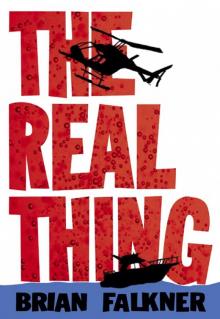 The Real Thing
The Real Thing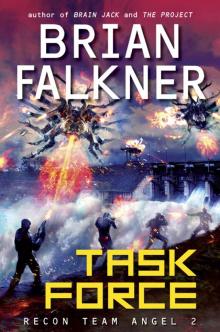 Task Force
Task Force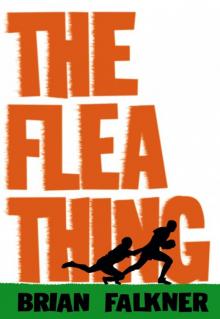 The Flea Thing
The Flea Thing The Project
The Project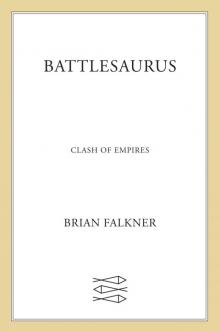 Clash of Empires
Clash of Empires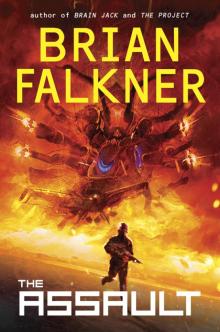 The Assault
The Assault Brain Jack
Brain Jack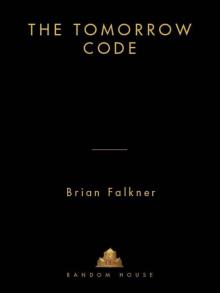 The Tomorrow Code
The Tomorrow Code Vengeance
Vengeance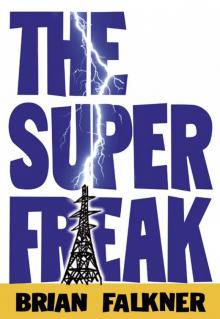 The Super Freak
The Super Freak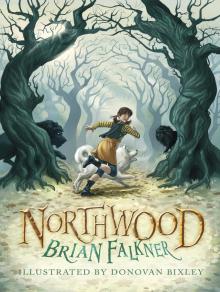 Northwood
Northwood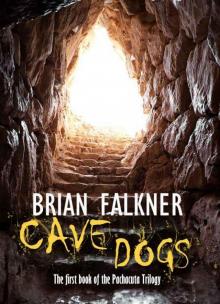 Cave Dogs (Pachacuta Book 1)
Cave Dogs (Pachacuta Book 1)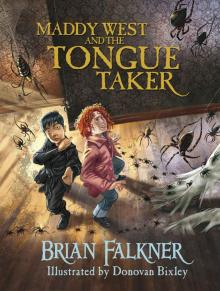 Maddy West and the Tongue Taker
Maddy West and the Tongue Taker